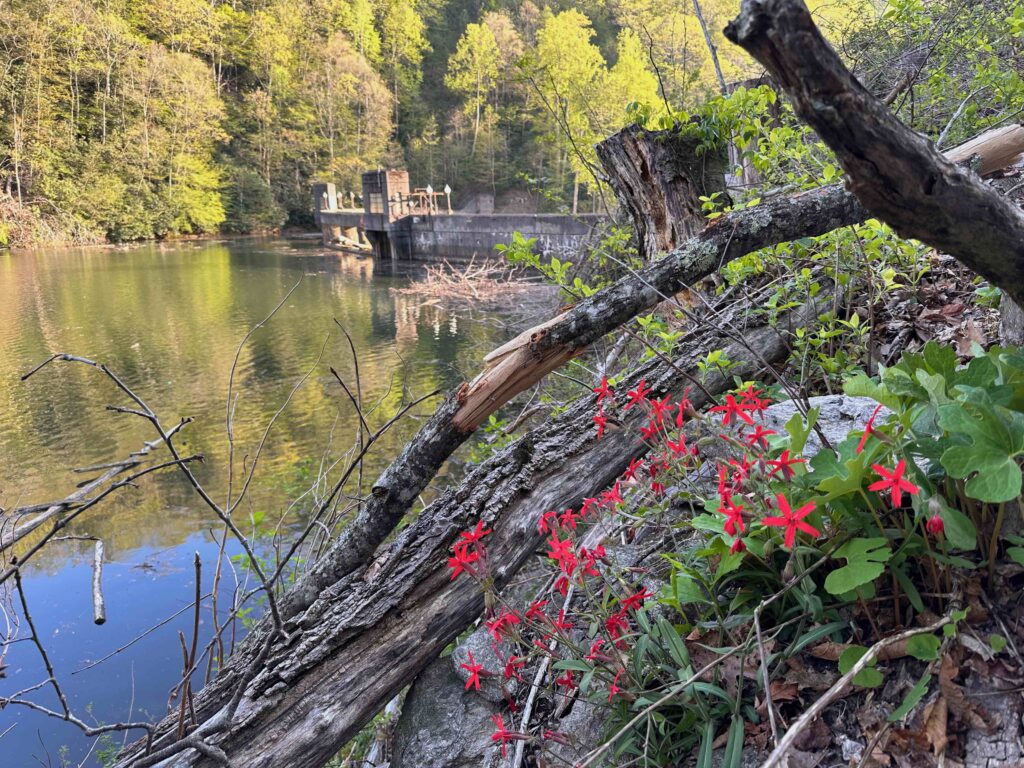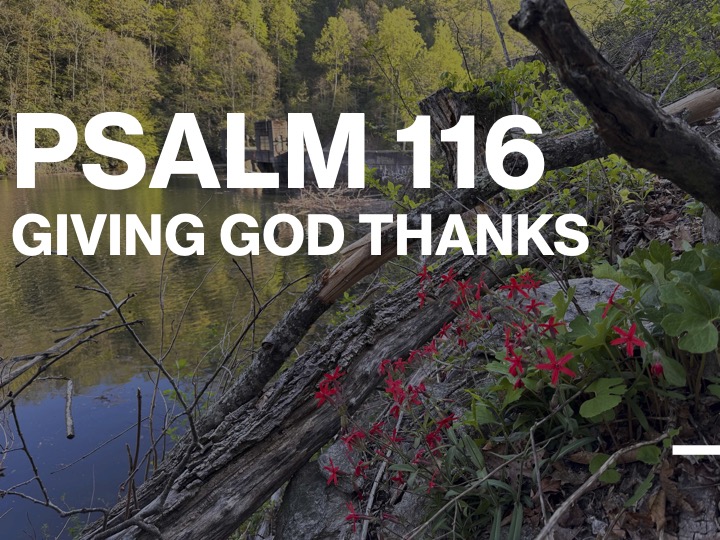Jeff Garrison
Bluemont and Mayberry Churches
April 23, 2023
Psalms 116
At the beginning of worship
You’ve heard it said before, I’m sure, that “no one gets out of here alive.” Sooner or later, our ride on Planet Earth ends. It’s a paradox of our faith.[1] We believe God will save us. But we also know our ultimate salvation will not be in this life but in the life to come.[2]
We must trust God. We believe that when we take our last breath on earth, there’s something more ahead. We are unable to go there by ourselves. We depend on God’s help. The hope we have in the resurrection to life everlasting isn’t anything we can prove or completely understand. We accept it on faith. Only God can call us forth from this life to the next.
Before reading the Scripture
Our text today will be the 116th Psalm. The Psalm has often been recited at the Jewish Passover meal as well as the celebration of the Lord’s Supper. The Passover reminded the Jewish people of their freedom from Egyptian bondage.[3] Our Lord’s Supper reminds us of the freedom we enjoy from our sins which was purchased by Jesus’ death and the hope we have in his resurrection.[4]
This is a psalm from an individual who offers thanksgiving to God for having been saved from some predicament. We don’t know the nature of his troubles. Perhaps enemies closed in on him or maybe it was illness. Whatever his concern, the Psalmist was near death when he cries out to God and God acts. Saved from death, he now lives in God’s debt. For this reason, he comes before the people to pay the vow he made to God as he praises the Almighty.
Read Psalm 116
“What shall I return to the Lord for all his bounty to me?” The Psalmist asks in verse 12. Having just acknowledged that he cannot trust people (“they’re all liars,” he says), he knows he can trust God because of his past experiences.
Like Psalm 16, which we looked at last week, things are going well for the one who wrote this psalm. Of course, he has had troubles. Perhaps an illness had him close to death, or maybe he was attacked and surrounded by enemies who were out for blood. “The snares of death encompass me,” he informs us.
Bargaining with God
Whatever the actual nature of his trouble, we don’t know. But it was real; he thought he might die. But that was in the past. The Psalmist cries out to God. He may have even done some bargaining with God. Do you ever do this? “God, if you can just help me get through this, I will go to your temple and praise your name and offer all kinds of sacrifices,” might have been his prayer. “God, if you help me this one time, I’ll be in church every Sunday,” we might pray. But do we follow through?
Not every request is granted
God is gracious and, in this case, God answered his prayer. Now, we should acknowledge that not every prayer gets answered in the way we’d like or hope. There are those who become sick and never recover. There are those whose enemies slay them. And don’t think we live in a more peaceful time than the Psalmist.
We live in a violent world
Sadly, the shootings we’ve seen this past week demonstrate this. An innocent mistake as person knocks on the wrong door and a shot ring out. Or a group of kids turn up the wrong driveway and from a distance porch someone fires a rifle at the car. Or the cheerleaders who mistake someone else’s car for their own and there’s a shot.[5] Or a basketball rolls into a disgruntled neighbor’s yard, and a kid is shot.[6] Sadly, we live in a world where people often act before they think. Or, in these cases, they grab their guns before their victims had time to explain or even cry out a prayer to God. Heaven help us!
We have a problem in our nation. That’s not the subject of this Psalm, but it’s worth pointing out. We need to understand it’s not just about our individual rights, but that all of us have rights and they overlap. God has created us all and for that reason alone, we are all precious, even the most flawed among us. That’s why community is most important. We need to treat everyone in a godly manner. Now back to the Psalm.
Trusting God first
Even with terminal sickness or in the middle of a violent situation, we’re called on to do what is right and to trust God. We hold to the truth, as proclaimed by Paul, that there is nothing, not even death, that can separate us from the love God in Christ Jesus our Lord.[7]
As I talked about earlier, for whatever reason, God saved the Psalmist. We should clarify this. God saved the Psalmist this time. This is important. Obviously, death caught up with him sooner or later. It does with all of us. Although we are not told of his death, we can assume Lazarus, who was raised by Jesus himself from the grave, returned to the world of the dead.[8] After all, no one has seen him run around Bethany since the first century. Sooner or later, this life comes to an end. But that’s getting ahead of our story.
The importance of giving thanks
Having experienced God’s grace in his (temporary) salvation, the Psalmist feels he must respond. You know, as my mother taught me, when you are given a gift, you should write a thank you note. It’s the proper thing to do. But the gift the Psalmist received was so great, a thank you note wouldn’t suffice.
A friend notes how when someone gives us five bucks to buy a slice of pizza at a food court, we should acknowledge it. We might say, “Thanks, Dude,” and maybe even give a slap on the back. But what if you were dying of a kidney disease and that friend gave you their extra kidney? “Thanks, Dude,” doesn’t cut it. Does it? We would be indebted to this person for the rest of our lives. From that point on, every breath we take can be credited to the gift of a kidney.[9]
This is the position the Psalmist finds himself in. The grace he’s experienced is so great. He must respond in a way that’s grander than lying in bed and saying, “Thank you, God,” as he falls asleep for the night. So, he heads to God’s holy city, Jerusalem. There in the presence of all God’s people, probably in the temple even though it’s not mentioned in this Psalm, he makes his sacrifice and praises God.
The importance of community
It’s important for him to be in community. In our faith, community is important for believers, even in prayer. Eugene Peterson puts it this way:
The assumption that prayer is what we do when we are alone—the solitary soul before God—is an egregious, and distressingly persistent, error. We imagine a lonely shepherd on the hills composing lyrics to the glory of God. We image a beleaguered soul sinking in a swamp of trouble calling for help. But our imaginations betray us. We are part of something before we are anything, and never more so that when we pray. Prayer begins in community.[10]
So, our Psalmist goes before the community of faithful. In verse 16, he humbles himself, acknowledging that he’s a servant of God. Then he points out that this isn’t something he came up on his own. His mother was also a servant. In other words, his faith was passed down to him.
But while he learned his faith from his parents and family members, it was this experience that really sealed his faith. And for this reason, he offers thanksgiving and sacrifices to God in public. He wants others to see what God has done for him, so that they might also place their hope in the Lord.
Conclusion
Psalm 116 reminds us that our prayers should not just be offered in private. We’re to witness to the world what God is doing in our lives. As Jesus tells us in the Sermon on the Mount, we’re to let our light shine.[11] May we always praise God and give God thanks for the blessings we have experienced. Amen.
[1] I came across this term from Scott Hoezee. See https://cepreaching.org/commentary/2021-09-06/psalm-1161-9
[2] See 1 Corinthians 15
[3] Psalms 115-118 are known as the “Egyptian Hallel” and associated with the fourth cup in the Passover. James L> Mays, Psalms: Interpretation, A Bible Commentary for Teaching and Preaching (Louisville, KY: John Knox Press, 1994), 371.
[4][4] May, 372.
[5] https://www.upi.com/Top_News/US/2023/04/19/ralph-yarl-kaylin-gillis-payton-washington-shooting/3341681935579/
[6] https://www.cnn.com/2023/04/20/us/neighbor-child-shooting-basketball-singletary/index.html
[7] Romans 8:38-39.
[8] See John 11.
[9] Scott Hoezee used this illustration.
[10] Eugene Peterson, Answering God: The Psalms as Tools for Prayer (San Francisco: Harper & Row, 1989), 84.
[11] Matthew 5:16.



A lot of truth here, Jeff. I stopped to think at “all of us have rights and they overlap”. That seems unresolvable any more. Sigh.
The only way our overlapping rights can be settled is through a focus on community, not individuals, in my opinion. I am seeing that more and more in scripture, the focus on the community over the individual
We do live in a violent world. Not much we can do about that except try to stay safe.
Anytime we help resolve a conflict or show a more peaceful alternative, we help reduce the tension and fear and violence. At least, that’s my hope.
It’s been a rough week, nationally (world-wide, for that matter) and personally. Thanks for that lovely, calming photo at the end of your post.
I’m glad you enjoyed the calming photo. Sadly, because of violence (911), access to the dam is much harder these days!